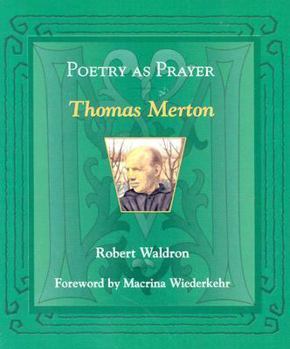Poetry as Prayer: Thomas Merton
Select Format
Select Condition 
Book Overview
Offers poetic verse as a means to prayer exploring the connection between culture and religion, creativity and mysticism, literature and life. This description may be from another edition of this product.
Format:Paperback
Language:English
ISBN:0819859192
ISBN13:9780819859198
Release Date:June 2000
Publisher:Pauline Books & Media
Length:180 Pages
Weight:0.53 lbs.
Dimensions:0.5" x 5.5" x 6.5"
Customer Reviews
1 rating
Only By Divine Gift
Published by Thriftbooks.com User , 24 years ago
Robert Waldron's introduction to the poetry of Thomas Merton is a splendid tribute to the late Trappist monk; more, the book itself is a small cavern of light where spiritual wanderers can find refreshment and restoration. The book begins by telling us how poetry can be read as prayer, as "secular psalms" if you will, and provides some valuable quotations about the connection between art and religious meditation, from Simone Weil and Pope John Paul, among others. There is a brief biographical chapter on Thomas Merton, as well as a survey of some of his more notable prose works. (We are especially grateful for the excerpt describing Merton's "Louisville Epiphany.") But the book is devoted to the poetry of Thomas Merton, and three poems are selected for extended exegesis: "Elias," "Night-Flowering Cactus," and "Stranger." These poems are from a kind of middle period in Merton's verse-work, after the early declamatory hymns of devotional imagery and stentorian phrasing, and prior to the jolly anarchy of "Cables to the Ace." These middle poems are especially well-chosen, spare without being stark, musical without being flowery. Waldron's patient stanza-by-stanza interpretation teaches us much, and convinces us that "Elias" is a great achievement, unfairly overlooked. (The reader is even invited into the red trailer where Merton composed the poem!) "Night-Flowering Cactus" must be read aloud, slowly and reverently; it is perhaps the poem in the book worthiest of comparison to a scriptural psalm. "Stranger" is a quietly luminous verbal icon, seeming to rhyme without actually doing so, with softly secure lines of a Blake-like or Roethkean simplicity. The book ends with suggestions on how best to read poetry in a prayerful fashion, and with an ample syllabus of poems by a variety of authors whose words instill the serenity (and sometimes the tumult) of religious contemplation. With boldly natural artwork by Helen Kita, a laudatory introduction by Sister Macrina Wiederkehr, and deeply respectful -- if not reverent -- exploration by Robert Waldron into Merton's verse, this book is perhaps the best in the "Poetry as Prayer" series. This reader is most grateful.





